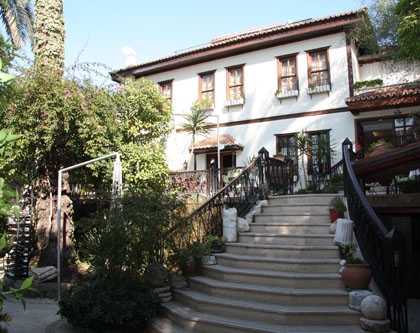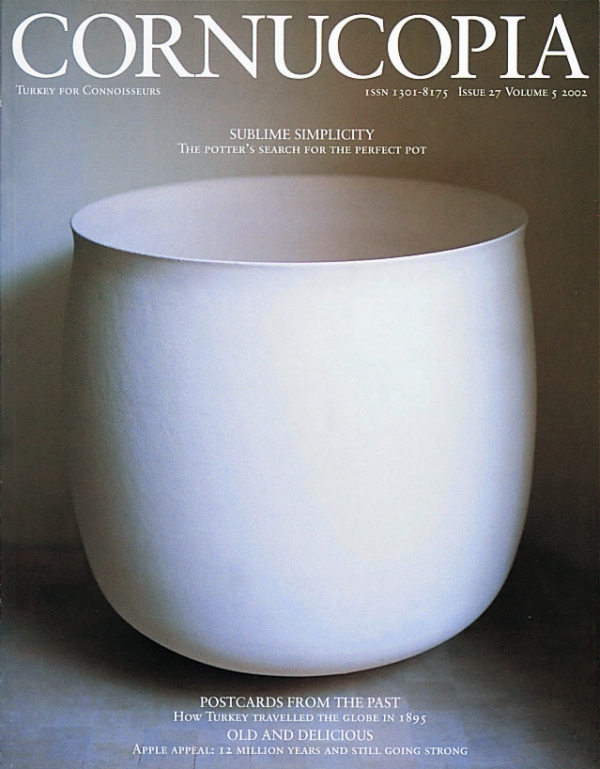Buy or gift a stand-alone digital subscription and get unlimited access to dozens of back issues for just £18.99 / $18.99 a year.
Please register at www.exacteditions.com/digital/cornucopia with your subscriber account number or contact subscriptions@cornucopia.net
Buy a digital subscription Go to the Digital EditionBrian Mathew looks back on the achievements of the late Asuman Baytop, who died in February. Portrait by Cafer Türkmen
Although those who knew Prof Dr Asuman Baytop will understandably be saddened by the news of her death on Wednesday, February 18, we must at the same time give thanks for a long and influential botanical career.
Her publications on various aspects of the Turkish flora are numerous, and the large and important herbarium of the Faculty of Pharmacy at Istanbul University (ISTE) – which she set up – includes a significant number of specimens she collected in Turkey during her wide-ranging travels. Her life’s work, the herbarium contains 58,000 specimens, of which she personally collected 23,300.
These collections greatly enhanced the materials available for researchers on the immense Flora of Turkey project (edited by PH Davis and published by the University of Edinburgh Press), to which she contributed. Volume 8 of the Flora (1984) was dedicated jointly to Asuman and her late husband, the celebrated botanist Turhan Baytop, also of Istanbul University, who died in 2002. The couple often went on plant-hunting ‘excursions’ together.
Asuman Baytop was born in Istanbul in 1920 and graduated in pharmacy from Istanbul University in 1943. Apart from a break in Switzerland to study for a doctorate, her career centred on the Faculty of Pharmacy, and she was appointed director of its Department of Pharmaceutical Botany in 1964. In 1987 she became emeritus professor and specialised in the study of the history of botany in Turkey.
These researches culminated in 2003 with the publication of her collected articles in Türkiye’de Botanik Tarihi Araştırmaları (Studies on the History of Botany in Turkey), edited by her daughter, Prof Dr Feza Günergun.
On a personal note, it gave me great pleasure to name a Crocus species in her honour: Crocus asumaniae, discovered by Asuman in 1973 near Akseki, above Antalya. In the same year she collected on Honaz Dağ, near Denizli, the first specimens of Crocus baytopiorum, notable for its unique pale turquoise-blue.
Asuman Baytop was a cultured and courteous lady, always with a warm welcome for those on study visits to the ISTE herbarium. We send condolences to her daughter, Feza, and other family members.
The Bulbous Plants of Turkey, by Brian Mathew and Turhan Baytop, is out of print, but available secondhand from Amazon.
ERRATUM: In the original print version of this article, we incorrectly stated that the Istanbul University herbarium contained 23,300 specimens (rather than 58,000), of which Asuman Baytop personally collected almost 1900 (rather than 23,300). The editor, rather the author, must take responsibility for this error.
Lovely churches, a lively market, enticing ice cream, shady cafés… and they called this the land of the blind. Andrew Finkel introduces Kadıköy, and Harriet Rix mooches around the district of Moda. Photographs by Monica Fritz
Maureen Freely goes ‘Bosphorising’ with her father, John Freely, in search of her treasured childhood in Istanbul. Could it be that it was all so simple then?
Turn your back on the Old City and make for the water. Andrew Finkel takes a drive along the Bosphorus’s lower shore: from the half-abandoned docks of Karaköy, past mammoth cruise ships and hangars for modern art, to the palaces of Beşiktaş and Ortaköy
Andrew Finkel extols the charms of a trip up the western, European, shore of the Bosphorus, whether by water or by road
Over 56 pages, we cross the Bosphorus to explore the lower reaches of the Asian shore. Sailing past the ruins of stately Haydarpaşa Station, we land at the busy Kadıköy docks, wander round Moda’s old cosmopolitan backwaters and head upstream to the sparkling hilltop mosques of Üsküdar
Continuing our tour of Bosphorus villages, we cross back to a more untamed Asian shore. Heading upstream again, we start in Beylerbeyi and Çengelköy, with their grand views of the Old City, and make for the fortress of Anadoluhisari, where the Bosphorus narrows and the yalis are at their most captivating. Our journey ends on the hilltop of Anadolukavağı, with the Black Sea in our sights
The potato was a latecomer to Turkish cookery, but today it is hard to imagine life without it. The humble spud, the ultimate in comfort food, is endlessly versatile,and also comes packed with goodness. Berrin Torolsan serves up some favourite dishes
Üsküdar – its history shaped by three powerful queen mothers and a tireless English nurse – has surprises to offer behind its unprepossessing façade: dazzling mosques, villagey tranquillity and epic views…





Cornucopia works in partnership with the digital publishing platform Exact Editions to offer individual and institutional subscribers unlimited access to a searchable archive of fascinating back issues and every newly published issue. The digital edition of Cornucopia is available cross-platform on web, iOS and Android and offers a comprehensive search function, allowing the title’s cultural content to be delved into at the touch of a button.
Digital Subscription: £18.99 / $18.99 (1 year)
Subscribe now